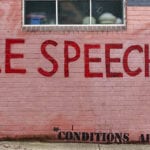 Weird Stuff
Weird Stuff  Weird Stuff
Weird Stuff  Mysteries
Mysteries 10 Tragic Disappearances and Deaths in Joshua Tree National Park
 History
History 10 Ways Childhood Really Sucked in the Old West
 Music
Music 10 Name Origins of Famous Bands from the 1990s
 Religion
Religion 10 Biggest Turnarounds by the Catholic Church
 Weird Stuff
Weird Stuff 10 Unbelievable Times Laws Had Unintended Consequences
 Humans
Humans Ten Historic Women Who Deserve Way More Credit Than They Got
 Movies and TV
Movies and TV 10 Films That Spawned Major Lawsuits
 History
History Ten Times Towns Were Wiped Off the Face of the Earth
 Creepy
Creepy 10 of the Most Disturbingly Haunted Public Houses in the UK
 Weird Stuff
Weird Stuff 10 Niche Subcultures That Are More Popular Than You Might Think
 Mysteries
Mysteries 10 Tragic Disappearances and Deaths in Joshua Tree National Park
 History
History 10 Ways Childhood Really Sucked in the Old West
Who's Behind Listverse?

Jamie Frater
Head Editor
Jamie founded Listverse due to an insatiable desire to share fascinating, obscure, and bizarre facts. He has been a guest speaker on numerous national radio and television stations and is a five time published author.
More About Us Music
Music 10 Name Origins of Famous Bands from the 1990s
 Religion
Religion 10 Biggest Turnarounds by the Catholic Church
 Weird Stuff
Weird Stuff 10 Unbelievable Times Laws Had Unintended Consequences
 Humans
Humans Ten Historic Women Who Deserve Way More Credit Than They Got
 Movies and TV
Movies and TV 10 Films That Spawned Major Lawsuits
 History
History Ten Times Towns Were Wiped Off the Face of the Earth
 Creepy
Creepy 10 of the Most Disturbingly Haunted Public Houses in the UK
Top 10 Terrifying Assaults On Free Speech Happening Right Now
Hands up: who loves freedom of speech? By our count, roughly all of you now have your hands waving about in the air. And why wouldn’t you? Free speech is a cornerstone of any modern democracy and arguably the most important provision in the US Constitution.
But just because we all agree that something is awesome doesn’t mean that it’s going to be around forever. Right now, free speech is under assault across the world. And unless we do something to defend it soon, we’re gonna find ourselves living in a world where the “free” part of free speech is only ever used ironically. Here’s why:
10 The War On Online Comments

You may have noticed that the Internet is a pretty nasty place. If you don’t believe us, feel free to go on Twitter and start sending out, say, pro-feminist or anti-Islam messages and see how long it takes for a lynch mob to form. But there’s recognizing that an environment is toxic, and then there’s attempting to sterilize it with a flamethrower. Right now, big Internet companies are choosing the latter.
Take the popular comment system Disqus. The company recently announced it was going to start censoring hate speech on its platform by deleting posts it deems “toxic.” In practical terms, this means that a shady algorithm will be removing reader comments from sites like Listverse without any input from our moderators or editors.
This is, to put it mildly, insane. It’s one thing for a site owner to decide what they will allow on their own site; it’s another for a comment platform to make that decision for them. Debates on controversial topics risk being censored because some biased algorithm deems something “inappropriate.” Then there’s the fact that it’s not Disqus’s place to delete inappropriate stuff in the first place. The First Amendment explicitly defends stuff most people would class as hate speech.[1] If we truly believe in free speech, that means believing that even the worst viewpoints have a right to be aired online.
9 Assaults On Anonymity

In 2014, the Internet group Anonymous doxed a whole bunch of KKK members, releasing their identities online. People across the political spectrum cheered. Those who didn’t focused on the danger of accidentally outing an innocent person as a Klansman. But precious few spoke out about the real danger of doxing. By taking away these dumb racists’ right to express their dumbly racist opinions anonymously, the hackers were imperiling free speech for us all.
Multiple US Supreme Court rulings have asserted that the right to anonymous speech is covered by the First Amendment.[2] Three of the Founding Fathers, for example, wrote the Federalist Papers under a pseudonym. Anonymity gives us the chance to criticize the government without fear of reprisal. It lets us publish pictures of Muhammad without worrying about being gunned down in the street.
Doxing endangers all of that. It’s a growing threat in our online world, but actual doxing isn’t the real problem. It’s how we respond to it that really matters.
If we act like it’s cool to dox Klansmen, Gamergaters, outspoken feminists, or anyone at all, we’re signaling that some people don’t deserve anonymous speech. That’s a slippery path to go down. It means people will stop saying what they truly think for fear of their identity being outed. When we’re scared to speak our minds, we no longer have free speech.
8 Rising Blasphemy Cases

Last week, Ireland announced it was dropping a blasphemy case against British actor and comedian Stephen Fry. Pause and let that sink in for a second. The crazy thing here isn’t that Ireland decided not to prosecute a comedian for saying God was “stupid.” It’s the fact that the law to prosecute him with even existed in the first place.
Sadly, the Irish example is one of a rising number of blasphemy cases that is threatening to destroy free speech across the world.[3] While Islamic nations tend to be worse, jailing or even executing people who insult the Prophet, Western countries are also getting in on the action. Poland prosecuted a singer in 2014 for ripping up a Bible onstage, while Greece handed out a ten-month suspended sentence to a guy who uploaded a picture of an Orthodox monk with pasta Photoshopped onto his face. Both convictions were quashed on appeal, but the fact that they ever went to trial is appalling.
As others have pointed out before, blasphemy laws don’t even make much sense on their own terms. If your God can’t deal with some doofus making spaghetti pictures of him, then he isn’t much of a God in the first place. Yet it seems not everyone sees it this way. As Britain’s Independent newspaper noted, a shocking number of people online responded to the 2015 Charlie Hebdo massacre not by reposting the offending cartoons (as we’re proud to say Listverse did) but by blaming the cartoonists for drawing them in the first place. If that’s not covertly supporting blasphemy laws, we don’t know what is.
7 The War On Journalism
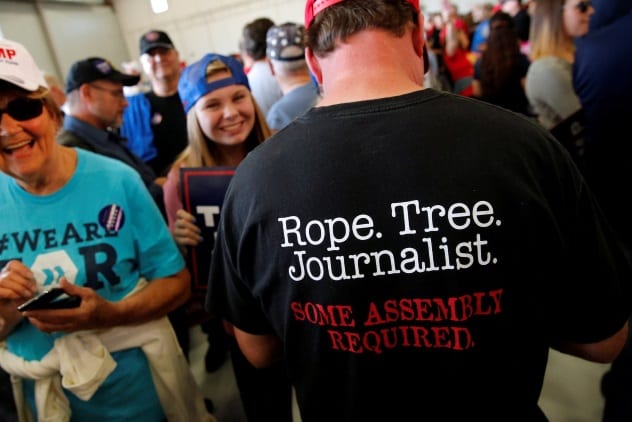
It can seem right now like the media is everyone’s favorite punching bag. While it’s right and proper that journalists should be challenged on shoddy research, it’s a problem when people start thinking of journalists as the “enemy.” As the Index on Censorship has noted, this hostile climate led to 2016 being the most dangerous year for journalism in decades.[4]
Freedom of the press is so entwined with free speech that the First Amendment explicitly mentions it. If a journalist can’t file a story that makes the powerful look bad, then it doesn’t matter what the man on the street is or isn’t free to say; you are living in an anti-democratic society. Worryingly, this appears to be the case across the world more and more often. Journalists are frequently murdered for writing unflattering stories in places like Russia or locked up and “purged” from their jobs in countries like Turkey (as 2,500 recently were following the coup attempt against Erdogan).
Worryingly, the West, too, is turning its back on media freedom. France recently passed a law that could throw journalists in jail for seven years for protecting sources, while in the US, President Trump has threatened to muzzle the press with egregious new libel laws.
6 Destroying Speakers’ Lives

At what point did we as a society decide that it was cool to completely ruin people’s lives just for speaking their minds? That’s a serious question. In the last few years, a trend has been building that sees those who slip up and say something “bad” forced from their jobs, publicly humiliated, and never able to work again.
This is seen clearest on US campuses. Over the past few years, students have tried to destroy the lives of administrators who wrote an e-mail that refused to condemn insensitive Halloween costumes, other students who made “all lives matter” posters, fraternities that threw Kanye West–themed parties, journalism students who wrote articles critical of Black Lives Matter, and professors who committed microaggressions as bizarre as questioning the concept of microaggressions.[5]
Is anyone else shivering due to the subzero chilling effect here? Worryingly, such humiliation of those who speak up exists outside the campus, too. In 2013, two random guys at a tech conference were covertly filmed making jokes about “big dongles.” They wound up losing their jobs over the phrase’s perceived misogyny. When we’re at the stage that we can’t even make piss-poor jokes with our friends without our livelihoods being trashed, something is seriously wrong.
5 ‘Cultural Appropriation’

While we’re talking about insane assaults on free speech, we might as well deal with cultural appropriation. Wikipedia helpfully defines this as “ the adoption or use of the elements of one culture by members of another culture.” In practical terms, it means that talking about anything from a culture that isn’t your own can now land you in big trouble.
For example, a professor at the University of Ottawa had her student exercise classes cancelled for discussing yoga, with complainants likening her class to “genocide.” Also, food website Bon Appetit removed a contributor’s video and made them apologize after they confused the foods ramen and pho (which is certainly dumb but not worth getting censored over).[6] Or how about when Iggy Azalea was hounded online for being a white rapper. J.K. Rowling was harassed for daring to write a Native American magician into one of her books.
Does anyone else think this is completely absurd? While not as awful as arresting journalists or putting blasphemers on trial, we seem to have gotten to the stage where people are forced into silence on some subjects because they’re not from a specific demographic. When we’re seriously debating if it’s okay for a non-Asian food blogger to write Chinese food recipes, something has gone badly wrong with our culture’s conception of free speech.
4 The Assassin’s Veto
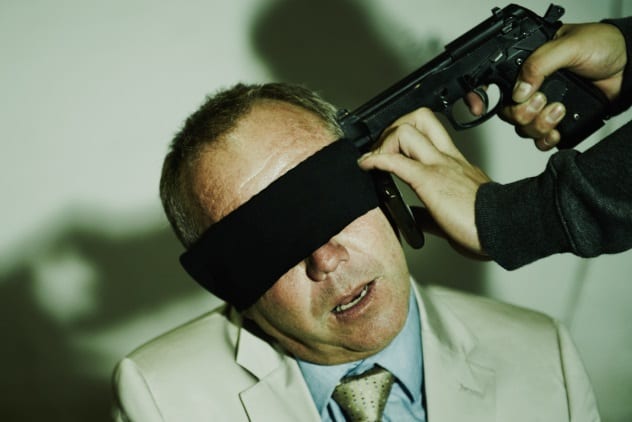
There’s nothing like the fear of death to stop you from speaking your mind. That’s the whole concept behind the assassin’s veto. By gruesomely killing a handful of people who say something you dislike, you’ll shut down that entire avenue of conversation. Right now, it’s a veto that’s being wielded across the world to terrifying extremes.[7]
A whole lot of the time, it’s directed against those who insult or denigrate Islam. The murder of Dutch filmmaker Theo Van Gogh for making a film about Muslim women being abused, the massacre of the Charlie Hebdo staff, and the hacking to death of atheist bloggers in Bangladesh has made even joking about Muhammad a dance with death. But it goes further than just the extremists of one religion. In Mexico, drug cartels have taken to torturing and brutally murdering anyone who speaks out against them. In Italy, the Mafia does likewise. In the US, both pro-choice and anti-abortion activists have been shot for simply expressing their opinions.
The bleakest part of all this is that it works. Speeches, plays, concerts, comedy shows, and lectures are all routinely canceled because of threats. Feminists, critics of Islam, right-wing speakers, and more have all been forced to curtail their own freedom of speech in case someone kills them. The effect is to dampen free speech across the entire world.
3 Weaponized Protest
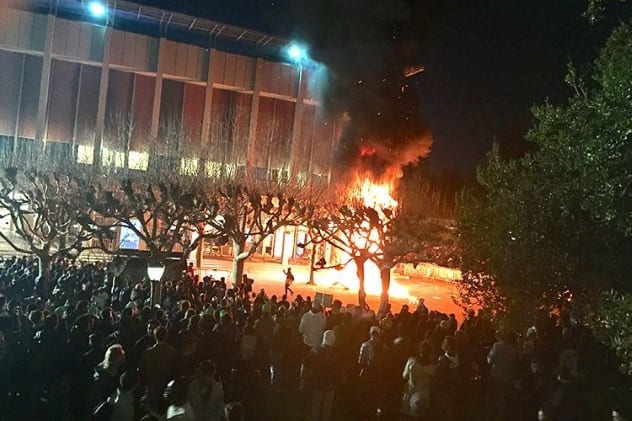
Freedom of speech includes the right to protest speech you disagree with. Those who punch protestors at rallies can no more claim to support free speech than Lenin could claim to support capitalism. But there’s exercising your democratic right to protest, and then there’s using that right to completely shut down the views you’re protesting against. Recently, it seems that protestors are aiming solely for the latter.
The idea of creating an environment your opponent is afraid to enter seems to have really taken off around 2013. Prior to that, protests at campuses rarely blocked an invited speaker from attending. Today, you hear about canceled lectures[8] with mind-numbing regularity. Right-wing speakers like Milo Yiannopoulos, Anne Coulter, and Ben Shapiro have been chased off college campuses, as have left-wing speakers like pro-abortion Supreme Court justice Carol Beier. Each time it happens, it demonstrates how little value is now placed on free speech and enlightened debate, versus simply shouting your enemy down.
2 Awful Misuse Of Sexual Assault Law

We can’t believe we have to write this sentence. Penning an essay that deals with student-lecturer relationships in US colleges is not sexual harassment. We all know that. Yet, sexual harassment is exactly what it has been classed as. In 2015, feminist film professor Laura Kipnis (pictured above) was placed under investigation and risked losing her job for writing that very essay. The reason for all this? The chilling, free speech–destroying Title IX.[9]
If you’ve never heard of it, Title IX was a piece of legislation which President Nixon introduced that originally protected women from discrimination in colleges. Under Obama, its remit was expanded, and now it deals with sexual assault and sexual violence against female students. At least, it’s supposed to. But the wording is so vague that it can conceivably be made to define almost anything as “assault” or “harassment.” The result? A swathe of American professors unable to start an intellectual discussion without wondering if they’re going to be fired and smeared as sexual abusers.
This isn’t abuse as you or I would define it. Professors have been labeled as sexual deviants simply for using the phrase “f—, no” in front of students. They’ve been investigated as sex offenders for having relationships with students years after those students have graduated. In the most chilling case of all, they’ve even been investigated for complaining about the chilling effect of Title IX itself.
By branding those who use rude words or want to discuss harassment as sex offenders, we’re destroying any pretense of intellectual freedom on US campuses. Not only that, but we’re trivializing genuinely awful things like rape, and for what?
1 Partisan ‘Free Speech’
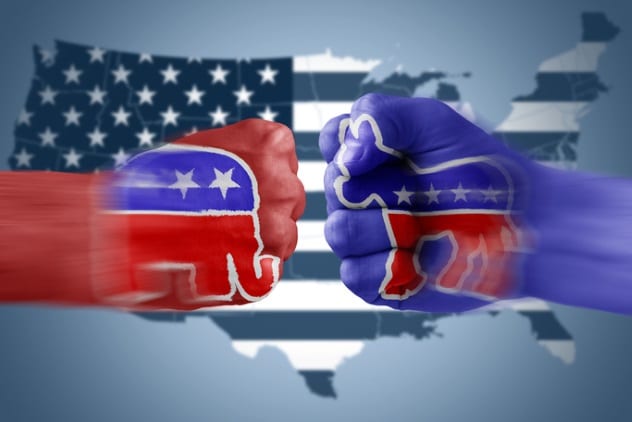
We mentioned earlier that supporting free speech means supporting free speech you do not like. Intellectually, we all agree with this. But in reality? It seems when push comes to shove, many people are only cool with free speech so long as it aligns with their values.
We saw this recently with the firing of flamboyant alt-right controversialist Milo Yiannopoulos from Breitbart. As long as Milo was using his free speech to attack women, feminists, and liberals, Breitbart was willing to champion his rights. The moment Milo said something that shocked conservatives (namely defending gay relationships between older men and teenage boys), they ditched him. Or look at parts of the left. During the Bush years, they vigorously defended the rights of libraries to stock books that the religious right disagreed with. Now they want to ban those same books for including “microaggressions.”
The trouble with writing about free speech is that people love their partisan bubble. They love to believe, for example, that being anti–free speech is purely the preserve of college liberals. But college conservatives also shut down speakers and try to get professors fired. A National Coalition Against Censorship survey recently found that both sides of the political spectrum are demanding trigger warnings for the different things they find offensive in books.[10] Yet if you asked most of them what they thought of free speech, we’re willing to bet they’d say they love it and that it was those on the opposite side who were against it.
If we carry on this partisan path, things are just going to get worse where the freedom to speak our minds is concerned. The real, terrifying assaults on free speech don’t come when small groups try to impose restrictions on us. They come when politics so blinds us that we’re willing to let our side say anything they want and then cheer them on when they try to shut down the other side completely.
